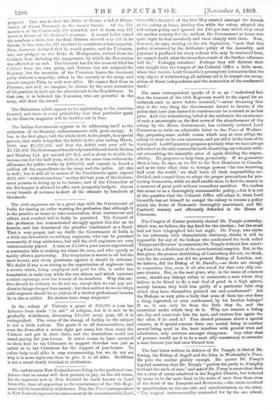The same correspondent speaks of it as an "undoubted fact
that the removal of the 18th Regiment would be the signal for an outbreak such as never before occurred,"—never dreaming that that is the very thing the Government intend to favour, if the policy they have just learned to condemn can be reversed at no less price. And this unhesitating belief of the settlers in the imminence of such a catastrophe on the first news of the abandonment of the colony by the Home Government, has evidently induced Lord Carnarvon to write an admirable letter to the Times of Wednes- day, proposing some middle course which may at once oblige the colony to trust to its own resources, and yet aid it in'the hour of its worst peril. Lord Carnarvon proposes precisely what we have always advocated as the only reasonable mode of assisting our colonists with- out committing the miserable error of again dividing the respon- sibility. He proposes to help them pecuniarily. If we guarantee them a loan, he says, as we did to the New Dominion in Canada, and as we have often done to foreign powers "far less deserving half over the world," we shall leave all their responsibility un- divided, and compel them to adopt the proper precautions for pro- tecting themselves, while we shall enable them to find the money in a moment of great peril without immediate sacrifices. We confess this seems to us a thoroughtly statesmanlike policy,—but it is out of the question that the Colonial Office will adopt it, when Lord Granville has set himself to compel the colony to reverse a policy which the Duke of Newcastle thoroughly sanctioned, and Mr. Cardwell warmly and efficiently defended in the House of Commons.






























 Previous page
Previous page